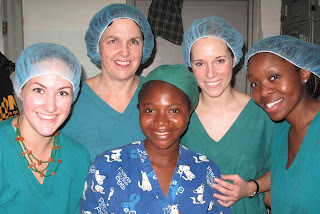Refreshed and well fed, we made our way out to the pool at our temporary accommodation and received our fill of vitamin D and story time. Shortly after, we were off to settle in at the Engineering Guest House at KNUST (Kwame Nkrumah University of Science and Technology). Those of us who had time quickly checked out our new hotel rooms and reported positive findings to the rest of the group. At last, we were ready to enjoy a day off from all of our hard work!
 |
| Post scene photo with the actors |
After a brief water and snack break, it was back to our mystery adventures in Kumasi. With some more luck and bargaining, we found ourselves at a festive music event where performers were sampling new music. There were hundreds of Ghanaians in attendance including a chief from a small village in the North. George had explained to us that people from the audience would be taken from their seats and brought up to the stage. With persuasion from the host of the event, friends would then have to help "bail" them out with donations. The donors would bring money to the stage and place it upon their head, which was seen as a sign of respect. One of our own, Skye MacLeod performed clarinet on stage with one of the Ghanaian musicians and while he performed, we each went to the stage and placed money on Skye's head.
 |
| Skye MacLeod jamming on stage in Kumasi |
We spent a little while longer listening to performers and being entertained by the host's enthusiastic mannerisms and intonation, although we were uncertain of what he was saying since he was speaking a native language from Northern Ghana. Before leaving, two students mustered up the courage to delve into the events a little bit further. One student was taken from the crowd and earned her donations to be freed and rejoin the group, while another joined the musicians, embracing the music and engaging in traditional African dance.
On our trip home, George explained to us how tribes in Ghana often receive different markings to help identify their tribe. Although this isn't as common today, some still practice it and a number of students had asked about the different types of markings that they had noticed. Interestingly, being in "Ashanti land" (Kumasi), we discovered that Ashanti's have a great disdain for tribal markings because there is a rule that no royalty can have marks on their bodies.
At the end of this adventure packed first day in Kumasi, we enjoyed our typical dinner of rice and chicken or fish. We learned our groups for our next three days in the Komfo Anokye Hospital and Effiduasi Methodist Primary School's "Unit School" and held a short review of the cleft palate course that many of us had taken this past summer. Winding down, we each headed off to our new rooms to rest up for an exciting week two of clinical work in our new location.
-Dana Peterson





















